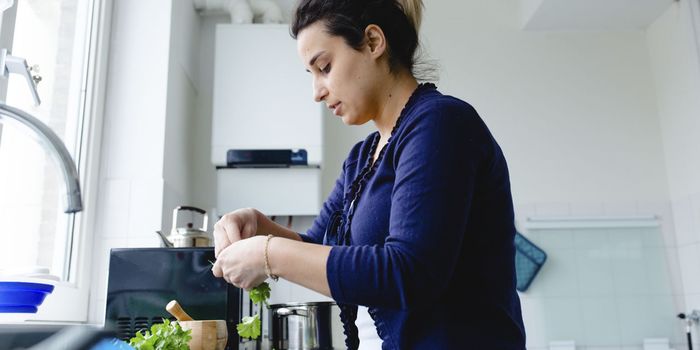What’s the safest way to lose weight?
It’s a question many of us have considered at one point or another – how can I lose weight? But while it might be tempting to start a diet and quickly cut calories, this can have downsides. And in the long run, there are other lifestyle changes you’ll need to consider if you want to keep the weight off. Here, we explain what you can do to lose weight safely. We also give some tips to help you put your plan into action.

How can I lose weight?
The best way to lose weight is to reduce how many calories you’re eating and get more active at the same time. This is often not easy to do. Losing weight can be hard, for a variety of reasons. Try to set yourself some realistic, achievable targets. This can really help you to lose weight gradually and keep it off in the long term.
How do I lose weight quickly and safely?
There's no quick-fix answer to long-term weight loss. Fad diets (also known as crash diets), are often promoted as a quick way of losing weight. But they can be difficult to stick to and won't help you to maintain a healthy weight in the long term. They can even be harmful. It takes time to build new, healthy eating habits, but losing weight gradually means you’re more likely to keep it off.
It might help to think of weight loss as a lifestyle change. You should aim to lose weight gradually – approximately 0.5 to 1 kilogram per week (1 to 2 lbs).
Remember, everyone is different, and some people might find they lose weight following different weight loss plans. The main thing is to try and find one that works for you. If you choose realistic weight loss goals, these can keep you motivated and on track to reach your long-term healthier weight. Achieving these will also help give you the confidence to keep going.
What changes can I make to my diet to lose weight?
To decrease your calorie intake, you may find it helpful to reduce your portion sizes, but it might also mean choosing different types of food. The key is to reduce your calorie intake while maintaining a healthy, balanced diet. Here are some things you can do.
- Cut down on foods and drinks that are high in fat and sugar – for example, sugary drinks, cakes, biscuits and fried foods. Have these less often and in smaller amounts.
- Aim for at least five portions of varied fruit and vegetables a day.
- Try to fill half of your plate with vegetables or salad.
- Add small amounts of wholegrain, starchy carbohydrates such as wholemeal bread or wholewheat pasta or potatoes with the skin on.
- Go for lower-fat varieties of milk and dairy products such as cheese and yoghurt.
- Lean protein, such as fish or chicken, is great. Substitute fatty meat with leaner cuts or high-fibre, low-fat alternatives such as beans and pulses.
- Boil, steam, grill, poach or microwave food, rather than frying it.
- If you drink alcohol, try to cut down. Alcoholic drinks are high in calories and can make you want to eat snacks. Try having some alcohol-free days each week.
As well as looking at what you’re eating, it also helps to think about your behaviours and habits around food. Here are some tips to consider.
- Try to stick to regular mealtimes.
- Use a smaller plate as this can make your portion of food seem larger than it is. It could also help you control your portion sizes.
- Eat slowly, chew every mouthful thoroughly and really concentrate on what you’re eating.
- Try not to eat at the same time as doing something that can distract you. For example, if you watch TV while you eat, you may not realise you’re full and eat more than you need to.
How active should I be to lose weight safely?
As well as making changes to your diet, being more active will give you the best chance of losing weight and keeping it off.
As a first step, think about reducing the time you spend being inactive. Then look at how you can build more activity into your daily routine. If you’re feeling ready, this might be the perfect opportunity to try out a new sport or activity. Try a few things until you find something you enjoy – that way you're more likely to keep it going. And start small. If you gradually build up the amount and duration of exercise, you’re more likely to keep motivated and be able to maintain a higher level of activity.
Eventually, you should aim to do at least 150 minutes (two and a half hours) of moderate-intensity exercise each week, such as swimming or cycling. Or, if you do vigorous exercise such as running, you should aim to do at least 75 minutes each week. And include muscle-strengthening exercises twice a week if you can.
Don’t worry if you’re not doing as much as this yet, because any activity is better than none.
How can I stay motivated to lose weight?
It’s normal to have good and bad days when you’re trying to lose weight. But you can start losing motivation if you’re feeling stressed, tired, frustrated or are very busy.
Here are some more ideas that may help keep you motivated.
- Think about your eating habits and try to identify the ones that might lead to weight gain. For example, if you eat while you’re stressed or while watching television, you might eat when you’re not actually hungry. If you can figure out what triggers those eating habits, you’ll be more able to change them.
- Plan your meals in advance if you can. This means you’re more likely to make healthy choices and less likely to rely on takeaways and convenience food. It could also save you money because you’ll only buy the food you plan to eat.
- Think about what really motivates you and how you can use this to stick to your weight-loss plan. Do you want to have more energy? Or improve your health? It might help to write down your goal and put it somewhere you can see it as a reminder.
- Make sure you build some rewards into your plan for when you achieve your goals. It might be buying a new item of clothing or a trip to the cinema. But it’s best not to make your rewards food-related!
- Don't be too hard on yourself if you slip up once in a while. Remember, you’re human and this might happen. It takes time to develop habits, but it helps to remember why you’re developing them in the first place.
- Support from family or friends can help when you’re trying to lose weight. You may find it helps to motivate you if you involve them in activities such as walking, cycling or going to an exercise class.
Are you interested in learning more about your health? Discover more about our range of health assessments.
-
Sources Sources
- Obesity: identification, assessment and management. National Instititue for Health and Care Excellence (NICE). nice.org.uk, last updated 8 September 2022.
- Obesity in adults. BMJ Best Practice. bestpractice.bmj.com, last updated 21 April 2022.
- Diet for rapid weight loss. MedlinePlus. medlineplus.gov, reviewed 29 April 2022.
- Healthy weight loss. Dietary tips for healthy weight loss. British Nutrition Foundation. nutrition.org.uk, last reviewed 19 October 2016.
- Losing weight. Centers for Disease Control and Prevention. cdc.gov, last reviewed 19 September 2022.
- Weight loss: food fact sheet. The Association of UK Dietitians. bda.uk.com, reviewed September 2021.
- Healthy living. Diet. Oxford handbook of general practice. Oxford Medicine Online. academic.oup.com, published online June 2020.
- How to lose weight safely. Nourish by WebMD. webmd.com, reviewed 15 February 2021.
- Physical activity guidelines: UK Chief Medical Officers' report. GOV.UK. www.gov.uk, updated 9 January 2020.
- Improving your eating habits. Centers for Disease Control and Prevention. cdc.gov, reviewed 3 June 2022.
- 12 ways to get your diet back on track. British Heart Foundation. bhf.org.uk, accessed 26 October 2022.
- Lanoye A, Grenga A, Leahey TM, LaRose JG. Motivation for weight loss and association with outcomes in a lifestyle intervention: comparing emerging adults to middle aged adults. Obes Sci Pract 2019;5:15-20. doi:10.1002/osp4.313.
- Healthy weight, nutrition, and physical activity – getting started. Centers for Disease Control and Prevention. cdc.gov, reviewed 16 June 2022.
- New physical activity guidelines. Department of Health. www.gov.uk, published September 2019.
- Personal Communication. Dr Sarah Griffiths, Lead Behavioural Insights Advisor, Bupa UK.
- Hughes JW, Goldstein CM, Logan C, et al. Controlled testing of novel portion control plate produces smaller self-selected portion sizes compared to regular dinner plate. BMC Obes 2017;4:30 doi:10.1186/s40608-017-0167-z.
- Good protein sources. WebMD. webmd.com, reviewed 13 January 2022.
About our health information
At Bupa we produce a wealth of free health information for you and your family. This is because we believe that trustworthy information is essential in helping you make better decisions about your health and wellbeing.
Our information has been awarded the PIF TICK for trustworthy health information. It also follows the principles of the The Information Standard.

More diet and nutrition articles
Did you find our advice helpful?
We’d love to hear what you think. Our short survey takes just a few minutes to complete and helps us to keep improving our healthy lifestyle articles.
Legal disclaimer
This information was published by Bupa's Health Content Team and is based on reputable sources of medical evidence. It has been reviewed by appropriate medical or clinical professionals and deemed accurate on the date of review. Photos are only for illustrative purposes and do not reflect every presentation of a condition.
Any information about a treatment or procedure is generic, and does not necessarily describe that treatment or procedure as delivered by Bupa or its associated providers.
The information contained on this page and in any third party websites referred to on this page is not intended nor implied to be a substitute for professional medical advice nor is it intended to be for medical diagnosis or treatment. Third party websites are not owned or controlled by Bupa and any individual may be able to access and post messages on them. Bupa is not responsible for the content or availability of these third party websites. We do not accept advertising on this page.






